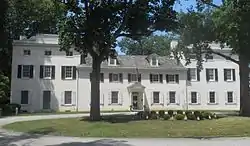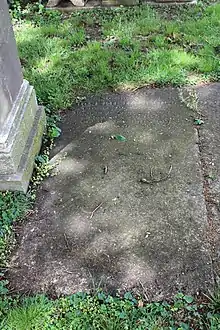Joseph Hemphill
Joseph Hemphill (January 7, 1770 – May 29, 1842) was an American politician who served as a Federalist member of the U.S. House of Representatives for Pennsylvania's 3rd congressional district from 1801 to 1803, as a Jackson Federalist representative for Pennsylvania's 1st congressional district from 1819 to 1823 and as a Jacksonian representative for Pennsylvania's 2nd congressional district from 1829 to 1831.
Joseph Hemphill | |
|---|---|
.jpg.webp) Etching of Joseph Hemphill by Max Rosenthal | |
| Member of the U.S. House of Representatives from Pennsylvania | |
| In office March 4, 1801 – March 3, 1803 | |
| Preceded by | Richard Thomas |
| Succeeded by | Isaac Anderson, Joseph Hiester, and John Whitehill |
| Constituency | 3rd district |
| In office March 4, 1819 – 1826 | |
| Preceded by | William Anderson, Joseph Hopkinson, John Sergeant, and Adam Seybert |
| Succeeded by | Thomas Kittera |
| Constituency | 1st district (1819–1823) 2nd district (1823–1826) |
| In office March 4, 1829 – March 3, 1831 | |
| Preceded by | Joel Barlow Sutherland |
| Succeeded by | John G. Watmough |
| Constituency | 3rd district |
| Member of the Pennsylvania House of Representatives | |
| In office 1797-1800 1805 1831-1832 | |
| Personal details | |
| Born | January 7, 1770 Thornbury Township, Province of Pennsylvania, British America |
| Died | May 29, 1842 (aged 72) Philadelphia, Pennsylvania, U.S. |
| Resting place | Laurel Hill Cemetery, Philadelphia, Pennsylvania, U.S. |
| Political party | Federalist Jacksonian Federalist Jacksonian |
He also served as a member of the Pennsylvania House of Representatives from 1797 to 1800, in 1805 and from 1831 to 1832.
Early life and education
Hemphill was born on January 7, 1770, to Joseph and Ann (Wills) Hemphill in Thornbury Township in the Province of Pennsylvania. He graduated from the University of Pennsylvania at Philadelphia in 1791. He studied law under Thomas Ross, was admitted to the bar in 1793 and began to practice law in West Chester, Pennsylvania.[1]
Political career
Hemphill served as a member of the Pennsylvania House of Representatives from 1797 to 1800. He was elected as a Federalist member representing Pennsylvania's 3rd congressional district in the Seventh Congress from 1801 to 1803.[2] He moved to Philadelphia in 1803, and again was a member of the State House of Representatives in 1805. He was appointed the first president judge of the district court of the city and county of Philadelphia. He was elected as a Federalist member representing Pennsylvania's 1st congressional district in the Sixteenth and Seventeenth Congresses from 1819 to 1823. He was elected as a Jackson Federalist member representing Pennsylvania's 2nd congressional district in the Eighteenth Congress, and reelected as a Jacksonian to the Nineteenth Congress, from 1823 until his resignation in 1826. He was elected as a Jacksonian member representing Pennsylvania's 3rd congressional district in the Twenty-first Congress from 1829 to 1831.[2] He was a member of the State House of Representatives in 1831 and 1832.[3]
Hemphill introduced a bill in 1824 which called for the usage of military personnel to conduct surveys and estimate costs for construction of roads and canals.[4]
He was an anti-slavery advocate and gave a speech to Congress against slavery, especially in Missouri. He declared slavery to be "the forcible oppression of otherwise powerless people".[5]
During the Congressional debate about the Indian Removal Act, Hemphill was split between his support for President Andrew Jackson and his Quaker constituency's opposition to the law.[6] He proposed delaying implementation of the act in order to conduct surveys of the land the Native Americans were to be moved to, but his proposal was voted down.[7]
Business career
In 1831, Hemphill's son, Alexander, entered into a business partnership with William Ellis Tucker for his porcelain factory in Philadelphia. Tucker died in 1832 and the firm was joined by Joseph and his brother Thomas. The factory continued production under the Hemphill name until it closed in 1838.[8]
Personal life

He purchased the Historic Strawberry Mansion in Fairmount Park from Judge William Lewis in 1821 and used it as his summer home.[9] He added the Greek Revival wings to the structure and was known to entertain John C. Calhoun from South Carolina and the Marquis de Lafayette from France.[10]
In September, 1806, he married Margaret Coleman, daughter of the wealthy industrialist Robert Coleman from Lancaster, Pennsylvania.[1]

He died in Philadelphia on May 28, 1842, and was interred at Laurel Hill Cemetery.[11]
A descendant, Alexander Hemphill, served as City Controller for Philadelphia from 1958 to 1968.[12]
Bibliography
- Mr. Hemphill's speech in the House of Representatives, on the 14th of January, 1823, on the following bill: To procure the necessary surveys, plans and estimates, on the subject of roads and canals., Washington, D.C., D. Rapine, 1823
- Mr. Hemphill's speech on the bill to construct a national road from Buffalo, passing by the seat of the general government, to New Orleans. Delivered in the House of Representatives, U.S. 23d March, 1830., Washington, D.C., Wm. Greer printer, 1830
References
- Futhey, J. Smith; Cope, Gilbert (881). History of Chester County, Pennsylvania with Genealogical and Biographical Sketches - Volume 2. Philadelphia: Louis H. Everts & Co. pp. 595–596. ISBN 9780788443879. Retrieved March 22, 2022.
- "The Political Graveyard: Helman to Hendershott". www.politicalgraveyard.com. The Political Graveyard. Retrieved March 23, 2022.
- Ashmeade, Henry Graham (1884). History of Delaware County, Pennsylvania. Philadelphia: L.H. Everts & Co. pp. 703–704. Retrieved July 16, 2017.
- Wettemann, Robert, P., Jr. (2009). Privilege vs. Equality: Civil-Military Relations in the Jacksonian Era, 1815-1845. Santa Barbara, California: ABC-CLIO, Inc. p. 79. ISBN 978-0-275-98603-2. Retrieved March 24, 2022.
{{cite book}}: CS1 maint: multiple names: authors list (link) - Shearer, Benjamin F. (2004). The Uniting States: Louisiana to Ohio. Westport, Connecticut: Greenwood Press. p. 681. ISBN 0-313-33105-7. Retrieved March 24, 2022.
- Cheathem, Mark Renfred (2008). Jacksonian and Antebellum Age: People and Perspectives. Santa Barbara, California: ABC-CLIO. p. 143. ISBN 978-1-59884-017-9. Retrieved March 28, 2022.
- Remini, Robert V. (1981). Andrew Jackson: Volume 2 - The Course of American Freedom, 1822-1832. Baltimore: The Johns Hopkins University Press. p. 262. ISBN 0-8018-5912-3. Retrieved March 25, 2022.
- Boger, Louise Ade (1971). The Dictionary of World Pottery and Porcelain. New York: Scribners. pp. 350. ISBN 0-684-10031-2.
- "Judge Joseph Hemphill". www.historicstrawberrymansion.org. Historic Strawberry Mansion. Retrieved March 22, 2022.
- "Strawberry Mansion". www.hmdb.org. The Historical Marker Database. Retrieved March 24, 2022.
- "Hemphill, Joseph 1770-1842". www.bioguide.congress.gov. Biographical Directory of the United States Congress. Retrieved March 22, 2022.
- "Alexander Hemphill, 64; served as City Controller". www.newspapers.com. The Philadelphia Inquirer. Retrieved March 25, 2022.